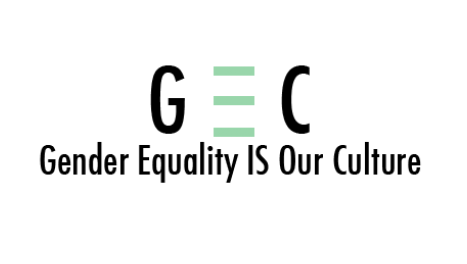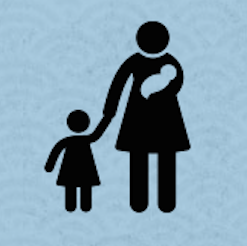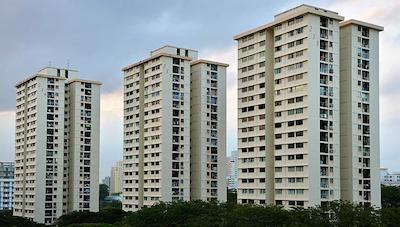 Home isn’t simply a physical space to live in. For many single parents in Singapore, finding a home of their own is an arduous journey, and for some, it remains a pipedream.
Home isn’t simply a physical space to live in. For many single parents in Singapore, finding a home of their own is an arduous journey, and for some, it remains a pipedream.
Last Wednesday, over 40 people – 20 of whom were single parents – gathered at AWARE to share about their struggles and frustrations with Singapore’s inadequate housing policies, which write them out of the picture of what a family deserving of a house should look like. Present at the dialogue was MP Louis Ng, who spoke about his own efforts in raising these issues in Parliament.
Most single parents are not financially able to opt out of government-subsidised HDBs – but the odds are stacked against them with discriminatory HDB policies, unsympathetic frontline officers and unclear eligibility criteria.
One single mother shared how she felt exhausted with having to deal with various obstacles over the past 15 years, and remained unsure about whether she could secure a home.
Divorced parents in the room were particularly frustrated with the debarment rule, and the current requirement that they obtain their ex-spouse’s consent to buy a new flat. One single father recounted how his ex-spouse simply refused to respond to his pleas for her written consent – a common experience for many who go through bitter divorces. Yet under the rules, his access to subsidised housing is dependent on being able to secure her consent to waive her own future entitlements – a design that seems very likely to result in frustration for many.
The buzz in the room heightened when participants got into a confused disagreement about when an ex-spouse’s consent is needed, despite several being personally affected by this requirement in different ways. It became clear then that there was a lack of clarity and accessibility in information on housing eligibility and an urgent need to not only reform these rules, but also improve how they are understood.
Single parents also touched on the $1,500 income cap for public rental housing, an unrealistic restriction with adverse consequences on social mobility. Said Carrie Tan, Executive Director at Daughters Of Tomorrow (an NGO AWARE has been working with on the #asinglelove campaign for single parents): “The mothers we work with tell us that if they get a job, they cannot get rental housing. Even HDB officers tell them not to get a job. The income cap does not make any sense.”
Participants also hoped the public would realise that existing housing policies might encourage people to stay in toxic and painful marriages. Rachel, a divorced mother, revealed that she “had to endure years of an abusive marriage just because they had a ridiculous law barring divorcees or singles under 35 from buying their own place.” Another divorced mother shared how she felt pressured to get married because of the stigma she faced as an unmarried mother – but is now still struggling through the difficult process of divorce and applying for housing.
One single mother was upset that she had missed out on key experiences shared by other parents, because of their lack of stable home. “I want a home so I can bring my two boys back and let them experience what a family is like.”
Unmarried mothers and their children are unable to form a ‘family nucleus’ to purchase a flat, as their children are considered ‘illegitimate’. For one unmarried mother, this denial of legal recognition to her family has been the main obstacle preventing her from securing a home.
Unfortunately, until these single parents can secure housing, they have little choice but to make do with uncomfortable and often cramped living arrangements, usually with relatives who are willing to accommodate them. Even then, single parents worry that such situations might pose an inconvenience to their relatives’ families or are unhealthy for their own children, with one single mother commenting, “How can a growing boy still share a room with his mom for another three years? I cannot tell my son to stop growing while I get a house.”
These restrictions create unnecessary hardship for many families. Everyone needs a home to live in and single parents are no different. AWARE’s petition seeks to address many of these concerns and make it easier for single-parents to secure homes for themselves and their children. Please support our efforts in pushing for changes to these laws and creating a Singapore that is more inclusive for all kinds of families.
“I had a rough idea of the obstacles that single parents faced, but I did not realise how helpless they felt until I attended the discussion. The exhaustion and confusion shared by many of the single parents made me realise just how problematic existing policies are. I empathised with them and their children and really wanted to help them, but this endless struggle will continue to plague single parents unless policies change.” – Deborah, attendee and supporter




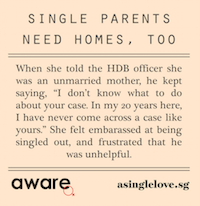
 Recent conversation acknowledging the reality of post-partum depression (PPD) is a positive step forward. But societal support needs to be more readily available for mothers affected by mental health difficulties, or struggling with childcare responsibilities.
Recent conversation acknowledging the reality of post-partum depression (PPD) is a positive step forward. But societal support needs to be more readily available for mothers affected by mental health difficulties, or struggling with childcare responsibilities.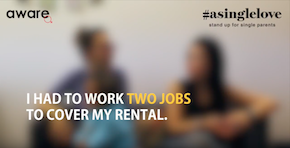
 The
The 